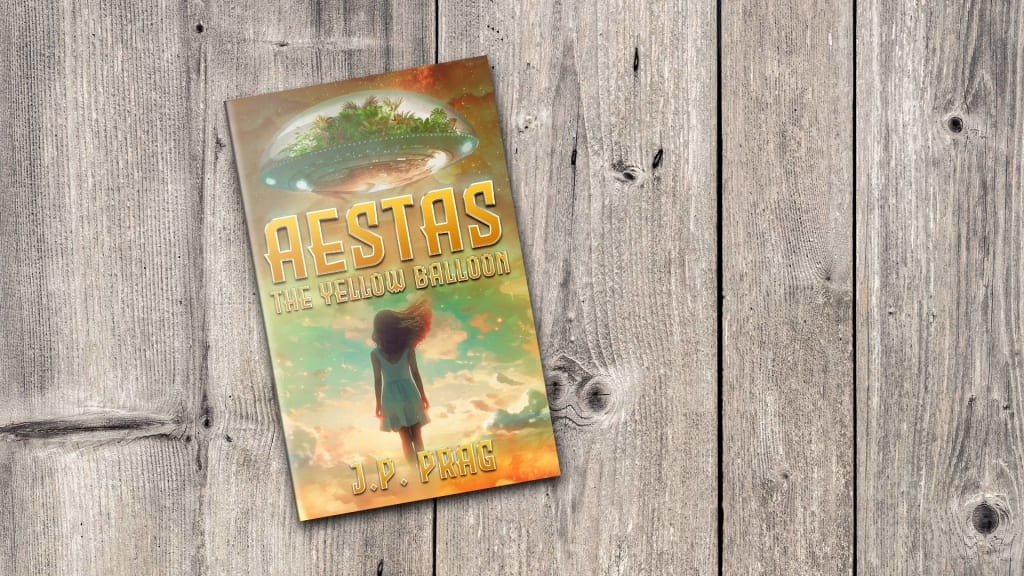Interlude 02 | Aestas ¤ The Yellow Balloon
:: Year 06 | January

“Lilit, are you even listening anymore?” Ahmad scolded.
“Ah, sorry!” the contrite Lilit jumped as she bumped up against her seatbelt. “I got a little lost in my own thoughts about clocks and history and class warfare...”
“It is alright,” consoled Durojaiye, “we are all concerned by what we are doing here. It is useful for your mental well-being to let your mind wander and get a little distracted from time to time.”
“I know,” Lilit intimated, “It’s just that... no, never mind. Ahmad, you were saying that Durojaiye was keeping his own time?”
“Well, I suppose I can repeat myself,” Ahmad grumbled. “What I said was that it was a surprise to hear that and I asked him why.”
Durojaiye reinserted himself into the conversation noting, “And I said, ‘Yes, well, I suppose I am just holding on to the last vestige of my old motherland.’ But please record for the official transcript that I did not yet offer the name of my country of derivation. This, I know, irked Ahmad at the lack of confirmation for his prior assumptions based on stereotypes.”
Ahmad gave Durojaiye a look that all but canonized his account of events. Through his clenched teeth he said, “As I recall, you declared that when we arrived you would have abundant time to make the full transition.”
“Oh,” Lilit chimed in, “this is where I can offer my professional expertise!”
“I do not believe that is your job anymore,” Durojaiye proffered.
“Hush, you!” Lilit playfully admonished, although under the surface there was a twinge of guilt and longing for her forsaken prior life that she would never admit out loud, not with the way people needed her to be now.
Slipping into her old shoes, Lilit lectured, “Durojaiye, what you thought was true enough. After you guys disembarked at Aestas, you would have had several months of physical therapy ahead of you to gain back the calcium leached from your bones and to learn how to ambulate again. These sessions could take the typical new arrival anywhere from three to six months, sometimes even up to a year. During that time, you would not have been allowed freedom of movement and instead would have been confined to the inside of a complex that was not completely dissimilar from being trapped within the ship you just got off of.
“To tell you guys the truth, not everyone was successful at these adaptations, either. In some semi-rare instances, a particular individual would never be able to fully acclimate to being on Venus for any variety of reasons, much like some people couldn’t cope with living on top of some really tall mountain on Earth in a place like... um... ah... what’s it called...”
“Tibet,” proposed Ahmad.
“Yeah, that’s it, a Tibetan mountain!” Lilit declared. “While some have no discomfort, others can never make it work. In these situations, the people often have to give themselves over to a type of indentured servitude aboard interplanetary shuttles—just like this one—attempting to make up the debt for the cost of their passage and eventual return to Earth. In reality, few have ever escaped their involuntary labor, but it is a concern the governments of the Sol System have chosen to turn a blind eye towards.”
Durojaiye clapped and said, “I am impressed with how well you can still recite these pertinent details, even if we are all well aware of these facts now... for obvious reasons. We were lucky to have found her, Ahmad, do you not agree?”
Ahmad looked like he wanted to come up with some witty quip in response, but instead simply nodded in agreement and said, “I do.”
“Listen, I will take over the storytelling for a bit,” Durojaiye pronounced. “Attempting to make conversation, Ahmad said to me, ‘When we land, you can stop thinking about taking a walk in the vacuum of space. We will be very safe down there.’ It was exceedingly kind of him to worry about me, though unnecessary.”
“I did not know that then,” Ahmad asserted, “though you oftentimes still give me reason to worry. But then you bemoaned, ‘Yes, stuck inside that Yellow Balloon.’”
Lilit gasped and yelled, “Durojaiye, you didn’t?! Oh, that’s so disgusting!”
“To my eternal shame, it is true,” Durojaiye acknowledged. “As I recall, Ahmad reflexively cringed much the same as you, and it showed on his face before he could stop it.”
Lilit hated the term “Yellow Balloon”. It was a derogatory phrase used by those on Earth and the other colonies who felt that Aestas was a complete waste of time and resources, things that could be—by their biased estimations—better spent elsewhere, notably projects that would cater to their own selfish needs and benefit them directly. Apparently, Ahmad had felt the same way about the pejorative axiom even before coming to Venus.
As if reading her thoughts—which was not an uncommon occurrence—Ahmad said, “Everywhere I had been on Earth, I met many people who felt this way about Venus, including my own parents. They were not supportive of my decision to immigrate to Venus, and made no qualms about letting me know. ‘Yellow Balloon’ came up quite frequently in their criticisms of my decision. Hearing it from someone on the same journey as me was quite disturbing.”
“Yes,” Durojaiye contritely agreed, “and seeing Ahmad’s reaction, I realized my egregious error. I wailed ‘I am so sorry; I have offended you. Please forgive me! It is just that sometimes I think about the fact that without those protective barriers, we would be sublimated almost instantaneously. Or if the city’s elevation dropped just a little bit, the pressure would crush us all.’ To be honest, I then began to list more ways we could die in the hostile vastness of Venus and outer space in general.”
“During that rant,” Ahmad cut Durojaiye off both in the present and the past, “my watch started beeping. Taking a look at it, I said, ‘I beg your pardon, I have overstayed my time by the windows. My rad-count has already exceeded my daily allotment and I must return to my quarters.’ Although most of the ship’s exterior walls are filled with machinery, water, and insulation—anything to slow down and hopefully stop the constant bombardment of cosmic rays—it is well known the solution is hardly perfect.”
Lilit was also aware that the meter-thick windows at the bow of the ship were the only things that allowed a view of anything other than the interior bulkheads. It was a reluctant concession the astronomers and physicists gave the shipbuilders and psychiatrists, with the compromise being that each passenger would wear a watch at all times that would measure their radiation exposure and absorption. The talk of it made her reflexively check her own, though she had not been near the edges of the ship in quite some time.
Ahmad continued, “It was then that I noticed that Durojaiye had nothing on his wrists but braided ornaments. ‘Durojaiye, where is your watch?’ I exclaimed in sheer panic and concern for the man I had just met. I then asked, ‘How long have you been here? Please, come with me back to the quarters. Maybe we should take you to sickbay to have you checked out?’”
“As I told you then and every day since,” Durojaiye interrupted, “you do not need to concern yourself with my safety. I informed you I would be fine and I was, as you can plainly see. HSA is overprotective of us and has guidelines that are far below what we can handle.”
“Somehow, this man is impervious to the death he regularly seeks,” Ahmad proclaimed. “He said to me, ‘I have done this many times; it is no problem. But if you wish to go, you may do so. Do not stay on my account.’ How many times have you done the same thing since we got on this vessel, huh?”
In response, Durojaiye sheepishly smiled wide, showing off an array of bright white teeth.
Unable to hide his annoyance, Ahmad said, “Having no intention of killing myself on his account, I implored Durojaiye one more time before wishing him peace and safety, leaving him alone. On the way back to my own quarters, I slowly pulled myself along the attached rails, wondering how a person could be both so fatalistic and reckless at the same time. I could not piece together the enigma that was Durojaiye; I could not make sense of this man. I am afraid understanding him is still a work in progress.”
“Would not many people say the same about you, Ahmad?” Durojaiye challenged.
“This... is true,” Ahmad conceded. “As a child, I became infatuated with watching a bright yellow spot making loop-the-loops on the low horizon. When it was the morning star, I would wake up early every day to see it. Conversely, when it was the evening star, I would drop everything, even abandoning a fútbol game with my friends to track it with my small, second-hand telescope. As I got older, my parents decided that I needed a better education than could be provided in the little village near our homestead and sent me to a private boarding school in Abu Dhabi. Sadly, the city was filled with bright lights at all times and I was unable to see Venus or most other dimmer celestial bodies.
“Unfortunately for my parents, in the cosmopolitan capital I was exposed to something far more dangerous: ideas. There were people from all over the world who made Abu Dhabi their home, either permanently or temporarily. More importantly, there were occasionally persons from off-world who helped me learn that not only was it possible to go to that wandering star, but to actually live there. Nevertheless, it was recommended that should I desire to do so, I must bring something to the table that they wanted and needed.
“As such, I spent the next several years learning about water reclamation, soil production, genetic seed manipulation, and other skills that could make me indispensable to any of the colonies. Should I ever get to Aestas, I wanted to make sure they would have no reason to refuse me, but instead would embrace me as a long-lost brother finally returning home.”
“Wow, that was quite a long side-trek through your entire autobiography during what was supposed to be the story of how we met,” Durojaiye expressed in the driest tone possible.
“Shut up, Durojaiye!” Lilit said in defense of Ahmad. “Ahmad, that was a beautiful revelation, and as your primary native Venusian contact—and still technically your official Coordinator—I am delighted to embrace you.” With those words, she unbelted from the table, swam over, and smothered Ahmad in a hug.
After holding on for over a minute, Ahmad attempted to push her off and said, “Ach, that is enough already!” Lilit giggled but held on for another few moments before letting go and reattaching herself to her seat.

The above piece is an excerpt from the speculative hard science fiction novel Aestas ¤ The Yellow Balloon by J.P. Prag, available at booksellers worldwide. Learn more about the author at www.jpprag.com.

As humanity begins to tame the stars above, at what point do a group of colonists turn into a unique, indigenous people who will band together to protect their homeland... no matter what?
Lilit Sarkisian was an average young woman who made a living welcoming new immigrants to the floating city of Aestas, soaring high above the clouds on Venus. Then, one day, she met her new clients Ahmad Al Zaheri and Durojaiye Yakubu. From that moment onward, her life irreparably changed and forever altered the course of the place she had always known as home. Somehow, these two became her best friends in the whole universe, and her most loyal coconspirators.
Aestas appeared to be a successful colony, much more so than places like Mars where terraforming had ultimately failed. Yet the powers-that-be, both on Venus and Earth, refused to do anything to alleviate the pressures caused by its exploding population. To fully resolve these issues, Lilit found herself evolving from an unknown civil servant to the leader of a revolution to a dangerous interplanetary symbol. Her story did not end there, though, nor did the machinations of those who had other plans for her birthplace.
With the help of her most trustworthy companions Ahmad and Durojaiye, was Lilit able to save the irreplaceable Venusian society from forces far more powerful than her?

Aestas ¤ The Yellow Balloon is a work of mixed fiction and nonfiction elements. With the fiction elements, any names, characters, places, events, and incidents that bear any resemblance to reality is purely coincidental. For the nonfiction elements, no names have been changed, no characters invented, no events fabricated except for hypothetical situations.
About the Creator
J.P. Prag
J.P. Prag is the author of "Aestas ¤ The Yellow Balloon", "Compendium of Humanity's End", "254 Days to Impeachment", "Always Divided, Never United", "New & Improved: The United States of America", and more! Learn more at www.jpprag.com.
Enjoyed the story? Support the Creator.
Subscribe for free to receive all their stories in your feed. You could also pledge your support or give them a one-off tip, letting them know you appreciate their work.






Comments
There are no comments for this story
Be the first to respond and start the conversation.